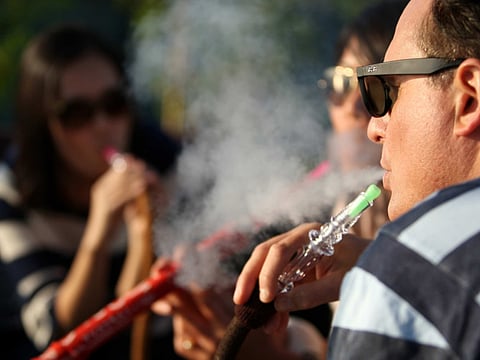Most of shisha users start habit from families
Smokers spread misconception that it is part of culture and tradition

Abu Dhabi: Most of the shisha users, including women, in Arab countries have started the habit from their families that still discourage cigarettes. This is despite the fact that shisha is several times more harmful than cigarettes, an expert said here recently.
Shisha is a water pipe made of clay, ornately carved metals or plastics, which enables smoking flavoured tobacco as it is bubbled through water. It is called nargile in Turkey and Syria, or hookah in India.
Parents encourage water pipe use, under the impression that it is less harmful than cigarettes, said Dr Rima Afifi, professor at the College of Public Health in University of Iowa College of Public Health.
She was talking at a public lecture titled ‘Dokha as an emerging epidemic: What can we learn from global tobacco control?’ at New York University Abu Dhabi (NYUAD).
Dokha is a tobacco usually mixed with herbs and spices and used in medwakh — a small smoking pipe popular in the region. Tobacco control experts who attended the lecture said alternative tobacco products such as shisha and medwakh have the presence of serval harmful trace metals and their emitted smoke contained injurious compounds including carcinogens.
Dr Afifi said many women users told her in a survey that their fathers encouraged them to start smoking water pipe. The survey was conducted as part of her studies about tobacco use in Lebanon, Syria, Egypt and Palestine between 2005 and 2012.
She said more awareness is needed to dispel the myth that alternative tobacco products are acceptable inside families because they are less harmful than cigarettes.
Talking about the cultural acceptance, another expert said smokers spread a misconception that smoking is part their culture and tradition.
“A study among Emirati males has revealed that most of the smokers are between 20 and 40 years. This means the older generation did not have this habit and it was not at all part of Emirati culture and tradition,” said Dr Mohammad Al Houqani, assistant dean for medical education and consultant of Internal Medicine at the United Arab Emirates University (UAEU).
Many old people have said they had seen cigarettes with British soldiers only in the Trucial States. Nobody else had the means then to buy cigarettes. Other tobacco products were also coming from outside, he said.
In a 2012 study conducted by the UAEU had found that medwakh smoking was the second commonest form of tobacco use [after cigarettes] in Abu Dhabi.
The experts said smoking is more of an economic issue than a health problem. “Some multinational tobacco companies have bigger budgets than that of national governments of some countries. It is a big business,” Dr Afifi said.
Echoing the same opinion, Scott Sherman, associate professor at the Department of Population Health at NYU, said if tobacco business cannot make profit, its sale would fall.
On a different note, another expert said tobacco indirectly helped the growth of epidemiology, the study of the distribution and determinants of health-related states or events, including disease, and the application of this study to the control of diseases and other health problems.
“In 1930s and 40s, doctors knew that tobacco caused health problems but they did not know how to prove it,” said Michael Weitzman, professor at the Department of Pediatrics at NYU. The studies since 1950s led to the growth of epidemiology, he said.
Sign up for the Daily Briefing
Get the latest news and updates straight to your inbox


